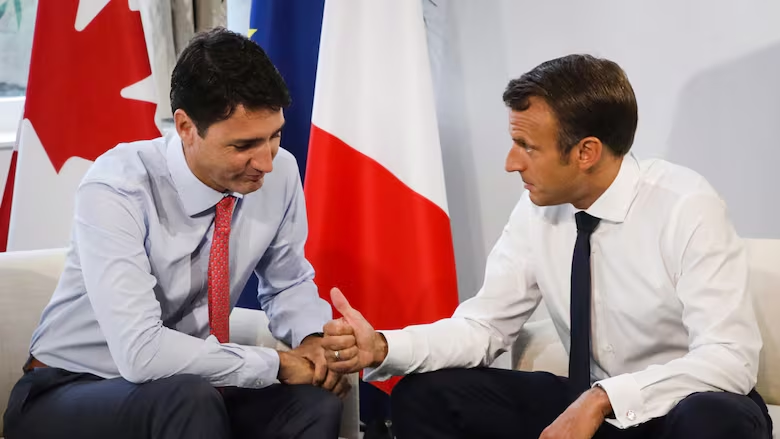How Macron gave Trump — and Trudeau — a lesson in the uses of power
Macron's intervention between the U.S. and Iran was an example of practical diplomacy in action

To most observers, it was dramatic, impressive political theatre.
And even if France's bold gambit to drag the United States and Iran back from the brink of war fails (as many of those same observers predict it will), it was a vivid expression of global power — the kind Canada has the desire, but perhaps not the capacity, to exert.
In 2015, Prime Minister Justin Trudeau eagerly declared that Canada had returned to the world stage after a decade of Conservative government.
"Many of you have worried that Canada has lost its compassionate and constructive voice in the world over the past 10 years," Trudeau said the day after the election. "Well, I have a simple message for you. On behalf of 35 million Canadians, we're back."
To the Liberal government's credit, it has taken leadership roles in a few key hotspots or potential flashpoints — Iraq and Latvia in particular.
Through his chairmanship of the Group of Seven (G7) in 2018, Trudeau was centre stage on two of the most important global social justice and environmental issues of our time: gender equality and halting the alarming loss of biodiversity due to climate change.
But those issues call for policy initiatives that will take a generation — or more — to bear fruit.

French President Emanuel Macron — described by some commentators as Trudeau's kindred spirit among world leaders — embraced those measures. But he also used his chairmanship of this past weekend's G7 gathering in Biarritz to deploy French power with dramatic flair in an attempt to get U.S. President Donald Trump and Iran's Hassan Rouhani in the same room to cut a deal on Iran's nuclear program.
A dose of reality
Rightly or wrongly, the expectations created by Trudeau's "we're back" moment seem more akin to what we saw Macron do in Biarritz than what came out of the G7 gathering under Trudeau's chairmanship in Charlevoix, Que., last year — even before that summit was hit by the wrecking ball of Trump's tweets.
"The French were focused on realpolitik," said Colin Robertson, a former diplomat and vice president of the Canadian Global Affairs Institute. "The French have a much better grasp of what will work" in these settings, he added.
Macron "moved yardsticks," Robertson said. "And whether they result in real gains, we'll see. But he really established France, once again, as a player."
Canada's foreign policy efforts under Trudeau haven't been entirely devoid of daring. The admission of tens of thousands of Syrian refugees in the weeks immediately after the last election, putting Canada at the diplomatic forefront for the rescue of Syrian White Helmet volunteers, Ottawa's response to the Rohingya crisis in Myanmar — they're all examples of important foreign policy initiatives for the Liberals.
'It's all a bit nebulous'
But given the scope of the problems facing the world right now, Robertson questions how effective Trudeau's approach to foreign policy has been.
"It's all good, but what have we done that has moved things significantly (on the world stage)?" he asked. "It's all a bit nebulous at the moment."
Robertson said he wonders if Trudeau has cultivated the necessary personal relationships with other world leaders, and the institutional support at home, to move the yardsticks in the way Macron appears to have done last weekend.
One member of the government who has moved those yardsticks — particularly with the White Helmet rescue — is Foreign Affairs Minister Chrystia Freeland.

She has established many close international relationships that have been instrumental in her work. She's also unwelcome in Russia, has angered both the Trump administration and Saudi Arabia and was recently criticized publicly by the Chinese over her comments on the situation in Hong Kong.
Some in the human rights community have suggested Freeland is irritating all of the right people — but a former insider suggested that too much fuss is being made about Freeland as a polarizing figure during trade talks with Washington.
"I think standing up for one's country is important, regardless of who is in power," said Sen. Peter Boehm, who acted as Canada's G7 organizer for the Charlevoix summit.
There are those who suggest that it's too early to say Macron made any material improvement in the relationship between the U.S. and Iran — that the two nations have, in the words of Anthony Cordesman of the Center for Strategic and International Studies, "reverted back to unnegotiable positions."
Cordesman argued in a recent analysis that the U.S. has so far been all "sticks" and no "carrots" with Iran.
He suggested that Washington work with petroleum importers like Japan and South Korea to offer Iran a major trade and investment package.
It would be, Cordesman wrote, an incentive for making "specific changes in its behavior."
Canada has not re-established diplomatic relations with Iran — but it could use its influence with Japan and South Korea to bring about such a deal and ease tensions among those nominal Far East allies.
"Essentially, we can ask, 'What can we do to be helpful?'" Robertson said. "There a lot of realpolitik things out there to do in the world, if you want to."


